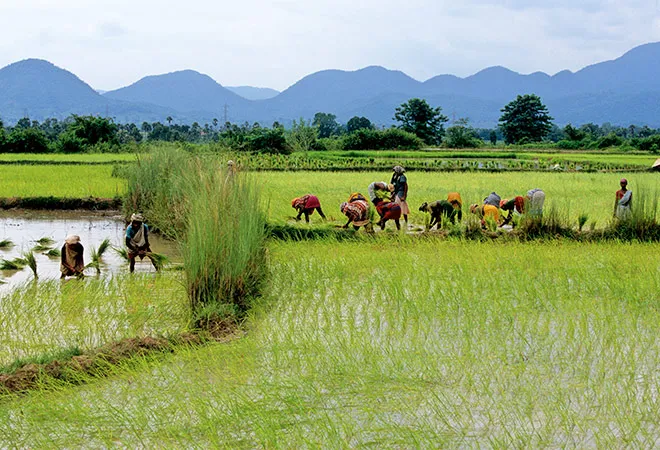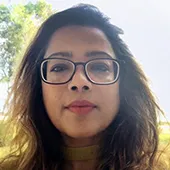-
CENTRES
Progammes & Centres
Location
The G20 will need to deliver on its collaborative commitment to accelerate the investment momentum in our agri-food systems in order to build sustainable and inclusive communities

Crippled by the conundrum of an increasingly divisive world, rising hunger inequalities, poverty, economic spillovers of the COVID-19 pandemic and climate extremes, we are in the midst of a perfect storm. The Ukraine conflict has fuelled a disruption in food supply chains with the prices of grains, staple cereals, oilseeds, and fertilisers skyrocketing beyond control. Violence and climate hazards triggered off 40.5 million internal displacements around the world in 2020 along with heightened food insecurities. Even more worrisome is the excruciating rise in global hunger with as many as 828 million in 2021 going to bed hungry every night, an increase of about 46 million since 2020 and 150 million since the outbreak of the COVID-19 pandemic, according to the recently launched 2022 edition of the State of Food Security and Nutrition in the World (SOFI) Report.
The Foreign Affairs Ministers and Development Ministers of the G20 adopted the Matera Declaration on Food Security, Nutrition and Food Systems.
Responding to the impeding challenges brought about by global food insecurity, the Foreign Affairs Ministers and Development Ministers of the G20 adopted the Matera Declaration on Food Security, Nutrition and Food Systems. This international collaboration by the G20 calls for ensuring sustainable food systems, poverty alleviation, agri-diversity, and territorial development as components of the COVID-19 emergency funding as well as targeted national recovery plans. Perhaps, what will be worthwhile to examine is its ambitious plan to feed investments, policy reforms, and better resource management for building resilient food value chains. One of its focal agenda highlights is the crucial role of Public Development Banks (PDBs) as agencies to stimulate private investments and mitigate market risks and failures, especially for financing small and medium enterprises. India has already made its position clear by declaring that the agenda resonates with its concern for the welfare of small and medium farmers and promoting agri-diversity. The G20 Development Ministers, in their Communiqué, hailed the formation of a “Finance in Common” Working Group on Financing Sustainable Food Systems, led by IFAD (International Fund for Agricultural Development), which brings together PDBs to stimulate more private sector investments to augment the productivity, incomes, and resilience of small scale producers; improve food and nutrition security; and create jobs. In fact, India is the only country to have secured loans from the IFAD to finance women’s empowerment and social entrepreneurship projects.
The United Nations Conference on Trade and Development (UNCTAD) has stated that the investment required in agriculture and food security between 2015 and 2030 is US $480 billion, and that there is an investment gap of US $260 billion (UNCTAD, 2014). With the COVID-19 pandemic worsening the overall prospects of food security and nutrition, . The poor in middle income countries with low savings and investment capacities are taking a substantial hit. Garnering multi-sectoral support will be paramount as PDBs, are perhaps, well poised to address market failures as they take on counter-cyclical roles and wield greater risk tolerance than other financial institutions. According to Finance in Common, over 420 PDBs operate around the world at the multilateral, regional, national levels, with their work intersecting between finance and public policy. They also hold enormous financial influence, which could well consolidate efforts to generate private sector investments for rural green recovery and for maximising social impact.
Garnering multi-sectoral support will be paramount as PDBs, are perhaps, well poised to address market failures as they take on counter-cyclical roles and wield greater risk tolerance than other financial institutions.
Interestingly, Public Development Banks already account for over two-thirds of formal financing in agriculture. PDBs operating in agriculture have a diversified capital base, mandates and operating systems, which are crucial to eradicate poverty and bridge inequities and that will eventually pave the way in supporting the 2030 Development Agenda. Armed with current annual investments of nearly US$ 1.4 trillion and with a mandate to pursue sustainable growth, their role will be vital to sustainable agriculture recovery and growth. But climate smart techniques, and the digitalisation of access to knowledge, finance and innovation comes with its own price tag, with an estimated requirement of US $300 billion to US $350 billion a year for the next decade. However, it must be noted that this is a rather tricky road as high transaction costs and risks in the food and agriculture sector often tend to choke financial institutions, particularly when it involves small-scale farmers with limited physical assets or credit history.
Bottlenecks like these can, perhaps, be countered by leveraging crucial political and financial clout to charter actionable results. And the G20 can be that effective for PDBs to facilitate a transformation across the financial ecosystem, which will encapsulate the entire gamut of the development narrative. Gender-based diversity as a cross-cutting mandate is increasingly becoming an intrinsic part of PDBs’ larger goal to ensure equitable development. By delivering a cache of digital solutions and blended solutions and offering responsible public-private investments, PDBs can mobilise sustainable and green finance aiding women, youth, MSMEs and small landholders to bootstrap their way out of poverty and reinforce strong food security networks. Under the leadership of the IFAD to strengthen their long-term investments in food and agriculture, PDBs are intrinsically linked through the G20’s Development Working Group first established in the 2010 Toronto Summit. Shared agreements emerging out of the 3rd G20 Development Working Group meetings (that met over three times this year in Indonesia) have laid the foundation for discussions on development co-operation at the G20 Development Ministerial Meeting held in Belitung, Indonesia on 7-9 September 2022.
India’s role as one of the founding members of the IFAD and the largest recipient of its investments now has the opportunity to showcase its efforts in plugging the agricultural financing gap to leverage transparent and sustainable food systems.
In this regard, India’s role as one of the founding members of the IFAD and the largest recipient of its investments now has the opportunity to showcase its efforts in plugging the agricultural financing gap to leverage transparent and sustainable food systems. Notable is NABARD’s (National Agriculture and Rural Development Bank) SHG (Self Help Group) Bank Linkage Project, which is now the largest micro-financing venture for the rural poor. Another big takeaway is the way rural women are establishing themselves as credible clients by becoming the best borrowers as well as the best repayers of loans (maintaining a recovery level close to around 95-96 per cent). The JAM (the Jan Dhan, Aadhar Mobile) Trinity has been another game changer in stimulating rural financial inclusion. What lies ahead now is to walk that extra mile to address some of the high priority women’s needs like accentuating the interlinkages between gender inequalities and climate change, as well as creating a negotiating space in high level discussions to highlight that investing in women results in good climate sense.
Another neglected sector that needs immediate smart financing is the care economy, as the pandemic laid bare a global economy dependent on women’s unpaid work. But positive headways made by some nations by allocating direct funding for childcare providers (the United States pledged a historic US $39 billion dollars) have shown how financial institutions can be influenced to respond to such crises. Examining cross sectoral high-quality indicators for financing as indicated above with a view to strengthen integrated components for blended financial programming may well go a long way in fulfilling the inclusive mandate of the ‘Matera Declaration’.
As the economic downturn continues to ravage our food systems, G20 members on their part must now show resolve and cohesion to lead their commitments to their actionable and profitable ends of advancing sustainable and resilient agri-food communities.
The views expressed above belong to the author(s). ORF research and analyses now available on Telegram! Click here to access our curated content — blogs, longforms and interviews.

Arundhatie Biswas, Ph.D is Senior Fellow at ORF. Her research traverses through multi-disciplinary research in international development with strong emphasis on the transformative approaches to ...
Read More +